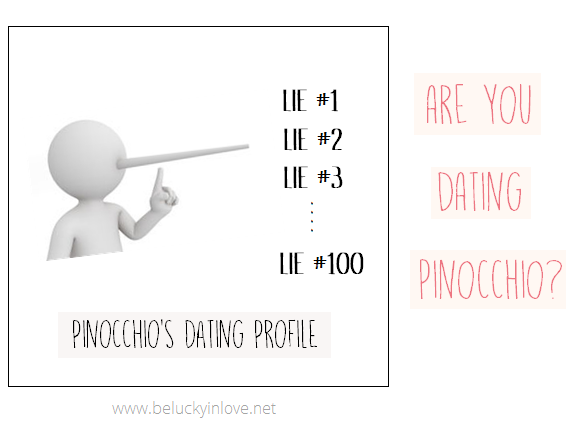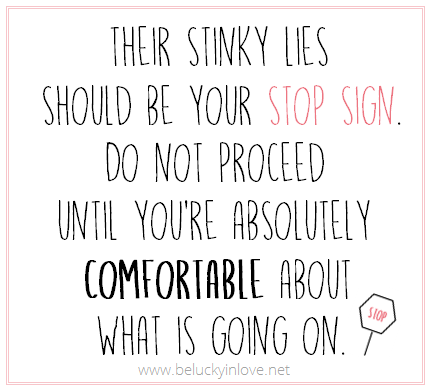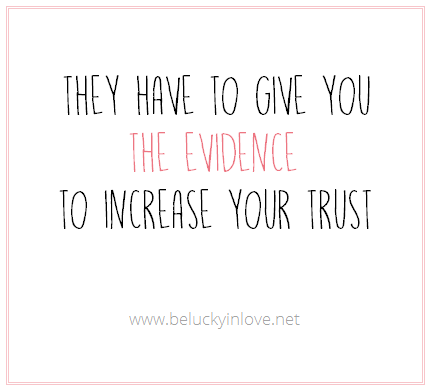Handling trust issues when dealing with deceptive online dating profiles
 Everybody knows that people lie on their online dating profiles. It does not mean, however, that everybody does, but many of them still do.
Everybody knows that people lie on their online dating profiles. It does not mean, however, that everybody does, but many of them still do.
Lying on dating profiles has become some sort of an accepted norm… with one tiny twist: we hope that although it happens to many other people it will never happen to us. We do not think we could become a victim, too.
If you refuse to believe in this theory, then why do you get so hurt and disappointed when the real truth comes out? Is it because you thought you were not like everybody else and these things could not happen to you?
Imagine talking to a virtual someone for 2 weeks, sharing your thoughts, plans and inspirations, trying to keep it light (even though sometimes it is difficult) and dreaming of your first meeting.
After two long weeks - and hopefully you did not have to beg for it - you finally meet. That’s usually the moment when whole hell breaks loose. Or does not.
~ were you able to recognize them?
~ did they look older, shorter or heavier than you expected?
~ were they rude in person vs. sweet in emails?
~ did they reveal something terrible about themselves?
~ did it suddenly feel like you were not a match anymore?
When these things and more suddenly flash into our eyes, like a beam of bright light, they paralyze our mind. We may even get panicky!

“Oh my God – you think – this is terrible. What a waste of my time”, and then “I should hide my disappointment in them and try to play it nice until the date is over… Yeah.. I need to come up with an excuse. It’s not going to work”… or, you may also like them enough to overcome the lies hoping for no more deal breakers in the future.
The paramount word here is ‘hoping’.
When we meet someone based on their lies, and then get shocked by true reality after that, we hope they won’t say or do anything more to ruin our shattered trust completely. We do not want to know more of the negative stuff because we feel like we have had enough already.
They, on the other hand, have all the reasons as to why they did what they did.
Just look what these con artists say!
~ I do not think I changed that much, I look the same as 10 years ago (yeah, right!)
~ yes, I am 20 lbs heavier, but only superficial people judge others based on their weight (oh yeah? Does it go both ways?)
~ I do not live with my wife and consider myself single and available (oh sure!)
Basically, these people committed a fraud: they lied about themselves to make you meet them. On top of that, they expect you to trust them too. What??
They get mad when you back away, won’t give them your phone number, the place you live, the place you work, won’t share images of your kids and your last name. They may blame you for being too paranoid, too careful, unrealistic, may make fun of you “hey, loosen up” or “stop being so uptight”.

They do not understand or cannot see the connection between their wrongdoings and how it makes us feel.
They got caught in a lie and made nothing of it. To them it was nothing, to us – a great deal of suspiciousness and discomfort. Notice how they almost NEVER apologize for a gross misrepresentation and NEVER try to make it up to us.
In fact, should you point out the discrepancies, you suddenly get blamed for being too personal too soon or chartering into prohibited territory. Like it should be none of your business what the real truth is and you are not allowed to ask ‘all those kinds of questions’.
Honest communication is not always easy and comfortable, and when we try to build an honest relationship with someone new by pointing out their lies, their defensive reaction makes it very difficult to build trust. Rather than to take on our bravery of pointing out and admitting to wrongdoings, they choose to continue on with their deceptive tune.
“What else are they hiding?” – is the burning question that is incompatible with Trust.
The solution here is incredibly Easy.
In the very beginning, when the sun is bright and the violets are blue, the minute we discover dishonesty, should be the time when an imaginary relationship should be re-evaluated.
Put your assumptions of them and what you have learned together and access what is going to work and what will not. Ask questions if necessary and observe their reaction. At this point you have nothing to lose. They stole your time, manipulated your emotions, tricked you into believing something that was not there, and shattered your trust.
It is up to you now to put dots over ‘i’-s and decide if you could continue. It is much easier to go over these things in the beginning than discovering them later with a bunch of anxiety and paranoia attached to it. The damage will be much greater.

Listen to yourself and assess the level of your inner discomfort. In your guts you should be absolutely comfortable with your decision to move or not to move forward.
If they are a decent person, they should appreciate your attempts to make the things ‘right’. It is difficult, uncomfortable, and scary to have honest communications with people we know, and even more difficult with those who we do not. They could at least make an effort to appreciate your courageous attempt, meet you half way and admit to wrongdoings. That would make it easier to trust them more.
As people unfold we adjust our level of trust. When they confess and cooperate our trust increases, when they screw up we take our trust back. It should never be about their comfort level, but rather ours. Yes, the truth is uncomfortable, but where there is no honesty there is no trust.
YOU MAY ALSO LIKE: Articles - Why online dating is such a disaster and Do not fall in love with The Beginning or is you feel like you need to talk to someone (this is my personal recommendation) - Affordable online counseling with a licensed professional
